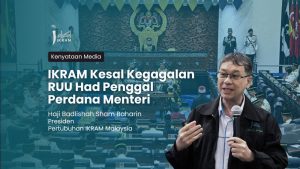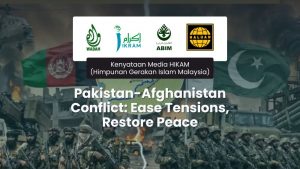In Part 1, I argue that Israel bore a major responsibility for the outbreak of hostilities due to their relentless persecution of the Palestinians, both Muslims and Christians, crossing all red lines and seeming impervious to the world’s reaction.
But the Israelis are exceptionally good at being the villains, playing the victims whenever the Palestinians resort to violence. They knew very well what the Arab nations reaction would be but felt their overwhelming military superiority plus their iron grip on American politics and public opinion would be enough to silence any form of protest and discord.
The post-October 7 world opinion, which initially favoured Israel and resulted in worldwide condemnation of Hamas for these “terrorist acts,” gave the Israelis what they thought was carte blanche to allow them to execute what they termed the final solution to their Palestinian problem.
However, this initial support and sympathies rapidly evaporated when the scale of atrocities, indiscriminate bombings and shelling of Gaza and the atrocities committed there were revealed to the shocked world, especially through social media.
People in traditionally Israel-leaning countries like America, the UK, etc. saw for the first time the level of destruction and cold-blooded slaughter happening in Gaza. The Israeli narrative is being shot to pieces as the truth emerges.
Even as I draft this article, protest marches on a worldwide basis are continuing, especially in America and the UK. Despite the threat of losing their jobs on a nebulous charge of being supporters of Hamas or anti-Semitic, people from all levels of society, regardless of religion, nationality or creed, are coming out to protest against the genocide in Gaza.
This is unprecedented, and many political commentators have said that this time there is a sea change and a shift in public opinion, especially in the West. There is also the phenomenon of a serious disconnect between the public and the political leadership in terms of opinion and sentiment.
Although Western leaders and ruling parties tend to give total support to Israel, besides attempting to demonise Hamas, the general public opinion in those countries is shifting in the opposite direction.
Last Sunday’s pro-Palestinian march in London, coinciding with Remembrance Day, saw an estimated 300,000 protestors (Metropolitan Police estimates) marching on the streets of London, the biggest protest so far. It also led to a clash between the Metropolitan Police chief and the British Home Secretary, something unprecedented in British politics, and the latest news reported that the British Prime Minister has sacked the Home Secretary.
In the US, protests are breaking out in major US cities, with thousands filling the streets in support of a free Palestine. Bloggers, social media influencers, etc. are using the virtual space of the internet to inform the public of the biassed and apartheid policies of the Zionists, highlighting in graphic details the suffering of the Palestinians and analysing the situation in a manner that did not exist before.
IfNotNow and Jewish Voice for Peace, two Jewish organisations in the US that are anti-Zionist and oppose Israel’s occupation of Gaza, also organised and participated in demonstrations of protest in the US. Public anger at the unjust and inhumane treatment of the Palestinians at the hands of Israel is surging like never before.
These developments are causing alarm in the establishments. As 2024 is election year for the US and UK, politicians are trying to assess the potential damage to their electoral prospects.
A Reuters poll carried out on November 15 found that 68% of Americans surveyed wanted a ceasefire and for Israel to negotiate with Palestinians, and 43% opposed sending further weapons to Israel. Support for Israel is down to only 31%, down from 40% in a similar poll carried out on October 12th. Indications are that these numbers are more likely to rise the longer this conflict goes on.
On the international sphere, countries like Ireland, Spain, Norway, Chile, Bolivia, Colombia, Honduras, tiny Belize, and South Africa are very outspoken and in the forefront of the struggle against Zionist Israel. Some of these countries have either recalled their ambassadors or cut ties completely with Israel in protest.
Spain and some NGOs and lawyers acting for Gaza citizens are going to file war crime charges against Netanyahu and Biden with the International Criminal Court, or ICC.
The ICC had earlier ruled that it had authority to hear about the charges, although Israel rejected the ICC’s authority. We will see how this pans out.
This is good news for the Palestinian cause. So, Malaysia is in particularly good company. We are not alone, and therefore, people who fear repercussions should “tiny” Malaysia upset America. To them, I say “jangan takutlah,” because otherwise you are on the wrong side of history.
There is every chance, God willing, that the tide is finally turning against Israel and towards the Palestinians.
What else can Malaysia do? I propose the following steps:
1. Ensuring that the Palestinian issue be elevated as a humanitarian catastrophe and not merely confined to an Arab-Jewish conflict or Islam versus Jewish war. This is especially important. The Zionist government of Israel does not discriminate between Christians and Muslim Palestinians. Both are equally mistreated.
At the same time, there are also very prominent Jews in the US and even in Israel itself who have been vocal in attacking the Zionist agenda as well as the current genocide in Gaza.
They too have suffered retaliation from the Zionists. Malaysia must therefore adjust its narrative on the conflict to differentiate between Zionism, a political and racial extremist ideology, and Jews as a race. It also must include concern for Palestinian Christians. At the present, these issues are befuddled.
2. Many people in Malaysia, even Muslims, who support Palestine do so mainly out of religious, emotional, and sentimental attachment but lack information and knowledge about the situation on the ground. Hence, they are unable to convince doubters and detractors, and they themselves are vulnerable to misinformation and false news.
The government needs to create this awareness so that the issues about Gaza and the West Bank are more clearly understood by the rakyat. Here, the use of mass media, TV, radio, and the press is crucial. Now is the time for RTM and the TV stations to provide a platform to highlight these issues. Travelling exhibitions and even a permanent museum about Palestine could be set up as an educational instrument for all Malaysians.
3. Malaysia should not fear US threats. The unilateral resolutions are part of a desperate measure to shore up support for Israel by bullying nations to toe the US line or else. As a sovereign country, we must reject any external pressure to influence our foreign policy.
4. Malaysia has a track record of supporting anti-apartheid and humanitarian causes stretching way back 63 years. For young Malaysians too young to know, Malaysia’s first Prime Minister, Tunku Abdul Rahman, played a pivotal role in the withdrawal of then-apartheid South Africa from the Commonwealth. The Sharpeville shootings provoked Tunku into raising the issue at the 1960 Commonwealth Prime Ministers’ Conference.
In 1961, South Africa left the Commonwealth. This was at a time when America and the UK had strong economic, military, and political ties with the apartheid South African regime. Together, they blocked many UN resolutions on South Africa, just like they do for Israel today. In 1975, we hosted a quarter of a million people fleeing Vietnam while our neighbours were reticent.
Our country was vocal and supported humanitarian causes in Afghanistan, Bosnia, Syria, the Rohingya crisis, etc. We played important mediating roles in quelling rebellions in both Thailand and the Philippines. Although our nation is small, our voice carries weight in the international community. This policy is well known and recognised internationally. So, Malaysia should carry on this policy without fear or favour.
5. Since PMX and his unity government took office, the Malaysia Madani tagline – Malaysia as a civil society aimed at creating a humane, just and compassionate society – was created.
Palestine is all about a people who have been unjustly treated, dehumanised, and suffering from ethnic cleansing. As a nation aspiring to reach the elevated levels of civil society, or Malaysia Madani, it is our responsibility to speak out against crimes against humanity. Now is the time to be vocal, not mute.
6. We eschew violence but support increasing humanitarian aid. Gaza needs urgent humanitarian aid to rebuild its shattered country, both now and for the near future.
The humanitarian aspect of our contribution needs to be the main agenda. We can do more, provided our entire population understands the issues and is mobilised to help in whatever way they can.
Give our humanitarian agencies like MyCARE, Islamic Relief Malaysia, Viva Palestina and a host of other NGOs and agencies space on TV and radio to highlight the issues, clarify any misconceptions about the situation in Gaza, and talk about the good work that they are doing in the occupied territories.
7. The entire educational system in Gaza, consisting of schools, colleges and universities, has been bombed into oblivion. Students, teachers and lecturers have been killed. Rebuilding them from scratch may take an entire generation. In the meantime, the education of young Gazans will be severely impacted.
Malaysia can open its door and give more scholarships to deserving students to be educated here. This is part of our role in educating the future generations of Palestinians to build a better future for themselves and for their homelands through education in science and technology.
Malaysia has hosted many Palestinian students before, especially those from Gaza. They have been excellent ambassadors for their homelands, intelligent, hardworking, and very well behaved.
I personally knew quite a few at UTM. So far, there have been no untoward incidents where they have gone against Malaysian law. What is true, however, is that Mossad assassinated Dr. Fadi Al Baths, an academic in Kuala Lumpur, in 2018 and attempted to kidnap another student in 2022. Just Mossad doing its dirty job.
8. Targeted boycotts of Western multinational cooperations currently focusing on the food and beverage industry must be extended. Boycott, Divest, and Sanctions (BDS) Malaysia has compiled a list of companies actively helping the Israeli economy.
At the end of the day, policies in the western world are dictated by bottom-line considerations. The government must allow the BDS movement to do its job in Malaysia by enlisting supporters, expanding lists of companies and businesses that are the main contributors to Israel, and helping it to perpetuate injustice against Palestinians.
9. Malaysian NGOs must also elevate their support for the Palestinian cause not merely within the national boundary but also seek to join and form broad-based coalition groups at the international level. Success will only come when there is a concerted and global push, and this is the best level of operation. This will be our biggest challenge, but Malaysians are more than game for the task.
Conclusions
In the 21st. century, Malaysia must not abandon its support for the oppressed Palestinians and not adopt policies focusing on satisfying narrow national interests (unlike the Arab countries bordering the conflict region, whose main contribution consists of mere rhetoric and refusing to make any tangible initiatives).
That is tantamount to “politik bacul” and selling off our souls. If we are to remain true to our Madani principles, we must step up our humanitarian efforts, especially in these critical times.
Dr Awaluddin Mohamed Shaharoun
Member of IKRAM Academia
15th November 2023







